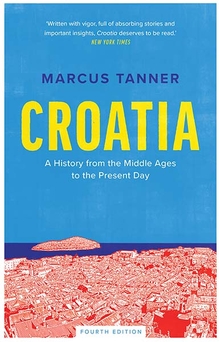The Serbs
WARNING
You are viewing an older version of the Yalebooks website. Please visit out new website with more updated information and a better user experience: https://www.yalebooks.com
History, Myth and the Destruction of Yugoslavia
Tim Judah
Out of Print
This wide-ranging, scholarly, and highly readable account opens with the windswept fortresses of medieval kings and a battle lost more than six centuries ago that still profoundly influences the Serbs. Judah describes the idea of "Serbdom" that sustained them during centuries of Ottoman rule, the days of glory during the First World War, and the genocide against them during the Second. He examines the tenuous ethnic balance fashioned by Tito and its unraveling after his death. And he reveals how Slobodan Milosevic, later to become president, used a version of history to drive his people to nationalist euphoria. Judah details the way Milosevic prepared for war and provides gripping eyewitness accounts of wartime horrors: the burning villages and "ethnic cleansing," the ignominy of the siege of Sarajevo, and the columns of bedraggled Serb refugees, cynically manipulated and then abandoned once the dream of a Greater Serbia was lost.
This first in-depth account of life behind Serbian lines is not an apologia but a scrupulous explanation of how the people of a modernizing European state could become among the most reviled of the century. Rejecting the stereotypical image of a bloodthirsty nation, Judah makes the Serbs comprehensible by placing them within the context of their history and their hopes.
"The aim of this book is to trace the history of the Serbs and to explain how they came to be where they are, and in the case of Croatia were until 1995. It is to trace the way that the centre of Serbian life migrated with its people from south to north and to explain how the idea of 'Serbdom,' as the Serbs call it, was kept alive during the centuries of Ottoman rule. It is also to explore why, with the fall of communism, they enthusiastically acclaimed Slobodan Milosevic, an opportunistic and cynical leader who was interested only in power."—From the preface
"An excellent reference to explain the motivation and actions of the Serbian leaders and people."—Steven A. Policastro, Armor
"Two fine and well-written works. . . . The authors, British journalists who covered the Yugoslav wars, are well worth reading. Their respective accounts give insights into the historical baggage the Yugoslav ethnic groups brought to their latest convulsions."—Dusko Doder, Boston Globe
"[Judah] set out to make a complex phenomenon comprehensible to the non-academic reader and has done so with great clarity and skill. For anyone who has served in the Balkans or who is due to do so, this book should be seen as indispensable reading."—Peter Williams, British Army Review
"This is a first-rate profile of the Serb nation from which general readers can derive a great deal."—Choice
"Tim Judah's book is an ambitious and valiant attempt to bring together the real history of the Serbs and the myths and theories in which that history was handed down."—Melanie McDonagh, Evening Standard
"An eloquent plea for the centrality of the past in any explanation of the catastrophic present. . . . A remarkable book about Croatia."—David Rieff, Globe & Mail
"Judah has written a readable and intelligent volume, carefully researched and judiciously constructed . . . about the unsuccessful attempts of the Serbs to re-create a greater Serbia."—William Peter Kaldis, History: Reviews of New Books
"In addition to being a work of real quality. . . . [it] fills an important gap. . . . A mix of on-the-spot reportage, history and analysis, well-researched and proof-read and conveying a sense both of immediacy and of a wider perspective."—Christopoher Cviic, International Affairs
"[This book] is well paced, reasonably succinct and very readable; [it] very properly and interestingly uses broad sweeps of history to help explain recent developments and present circumstances."—George Bull, International Minds
"A stunning new history."—Robert Fisk, Irish Times
"Stressing the Serbs' misuse and mythologizing of history, Judah offers an insightful, informed, and trenchant consideration of their history and their collective outlook. . . . A stylish and highly readable account by an experienced journalist. . . . His presentation is nuanced, focused, and rich with motifs that he follows from the Middle Ages to the present. . . . Judah's excellent book stands out in a cluttered field, offering the key to Serbia's behavior over the past decade."—Kirkus Reviews
"The book's scope and quality recommend it."—Zachary T. Irwin, Library Journal
"I found Judah's work to be highly original, providing new insight into our reading of the collapse of Yugoslavia and the rise of Serbian nationalism. In addition, his treatment of Serbian history was also thorough and clever. . . . [It] is extremely well written and interesting. Judah weaves together a rich tapestry of historical Serbian myths, and demonstrates their current applicability in Serbian national thought, and as motivating factors in the Yugoslav crisis."—David B. MacDonald, Millennium, Journal of International Studies
"Tim Judah writes splendidly. . . .The story he tells does much to explain both the Serb obsession with the treachery of outsiders and their quasi-religious faith in the eventual founding, or rather reestablishment, of the Serbian state."—Mark Danner, New York Review of Books
"Tim Judah has written a lively and balanced history of the Serbs that begins with their successful medieval efforts to establish a state and ends with their failed attempt in the 1990s to create Greater Serbia."—Aleksa Djilas, New York Times Book Review
"This book is much better than any comparable volume. . . . The entire book is very readable and tells a compelling story."—South Slav Journal
"A very good book...Judah cleverly interprets Serbia's sad present in the light of its past."—Sunday Times
"[Tanner and Judah] bring to bear wide knowledge of Yugoslavia and shared experience of Europe's worst war since 1945. Each gives a good historical survey and an account of the war's causes."—The Economist
"[Judah]has written a thoughtful, humane, and acute portrait of the Serbs which draws together history, modern politics, and war to explain how they came to be where they are. . . . A fine, impartial study which deserves to be translated into Serbo-Croat and will surely be consulted long after the present conflict abates."—Tom Gallagher, The Herald
"Judah . . . offers a highly readable history of the Serbs from medieval times to the present, with judicious comments on the rise of the Kosovo Liberation Army and Nato’s bombing campaign. It is one of the best attempts to explain a situation which has baffled the West throughout history."—The Herald (Glasgow)
"Readable and stimulating. . . . Judah's book is a polemical attempt to counter the 'demonisation' of the Serbs. But it is far from being a whitewash: with very few exceptions, he successfully walks the tightrope between 'balance' and relativisation."—Brendan Simms, Times Higher Education Supplement
"Judah's book is probably the best attempt to date to explain the calamitous situation of the Serbs today through a meticulous consideration of the Serb past."—David Rieff, Toronto Globe and Mail
Publication Date: August 11, 1998
40 b/w illus.








